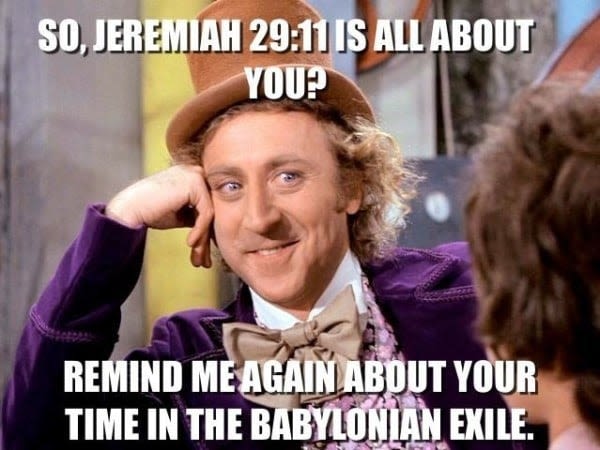Jeremiah 29:11 “For I know the plans I have for you,” declares the Lord, “plans to prosper you and not to harm you, plans to give you hope and a future.”
The Bible as desk-calendar quotes:
Perhaps we can trace the blame for this back to a guy called Stephanus, in the year 1551. He was sick of having to say, “you know that bit in Galatians where Paul says…” and instead added verse numbers every sentence or so. It’s handy for referencing, of course. But it also encouraged us to see the Bible as a set of isolated sayings, where each verse started a new line, and so, a new independent thought.
The whole Bible got broken up and treated like Proverbs—a collection of wisdom, rather than a story. So rather than memorising stories or longer passages, people started to memorise these isolated verses, stripped of their context. And in the process, they made it all about me.
Now what verses do you choose for special photo-framing treatment? Not usually the ones about judgement and warning—unless you’re planning on placard-waving outside abortion clinics or the Mardi Gras parade. No, they tend to choose all of the blessings and promises and feel-good verses. What’s more, no longer blessings and promises in a context, but blessings and promises that were seen for everyone, all the time—and in particular, for me. Just like Jeremiah 29:11.
Jeremiah 29:11 in context
Jeremiah 29:11 “For I know the plans I have for you,” declares the Lord, “plans to prosper you and not to harm you, plans to give you hope and a future.”
Now this is all very reassuring and positive, isn’t it? It gives us hope and confidence. I mean: who doesn’t want prosperity and security! The problem is, it’s not written to you. Or to me. It’s not a general promise for all who hear it, like, say, John 3:16 – “that whosoever believes in me will not perish.”
It’s a specific word to a specific people in a specific situation. It’s a promise to one particular generation of the people of Israel—those who’ve been exiled to Babylon, and face the possibility of being wiped out.
What’s more, it’s embedded within a more sobering message that tells Israel to settle down and make the most of it, because God won’t be bringing them back out of exile for another seventy years.
To pick that out and say “that verse is for me”—or even, “that verse can be for me, too, not just exiled Israel”—is to ignore several things. It ignores not just the original context, but also the clear message given by Jesus for his followers not to expect prosperity in this age; and indeed, to expect to be harmed (see e.g. Mark 8:34; John 16:2 ).
It also ignores the very real experience of the many Christians who’ve been imprisoned or martyred over the centuries. Why would it apply to us, but not them?
Now don’t get me wrong. That verse—indeed, that whole passage in Jeremiah does apply to us. It applies to us because it’s part of the big story that we’re now a part of. It’s part of the history of the covenant-keeping God who cares for his people, to which we can belong because of the death and resurrection of Israel’s Messiah that now enables those who were far away to be brought near ( Eph 2:11-22 ).
However, the promise that they would materially “prosper” and not be physically harmed was for a specific time in Israel's history. Even Israel couldn't apply that to themselves at all subsequent points in their history.
Where the Jeremiah promise finds its completion is in the age to come, where all God's people will indeed find rest and freedom from harm. It’s in that sense that it makes a great motivational poster quote! (And what I think about as I drink from my coffee mug.)
A return to “whole foods”
But, you might say, what’s the harm in taking these verses out of context if they inspire us? If they make us feel better, and remember to trust in God? What’s wrong with that?
The problem comes when bad stuff happens. When I “claim” a specific promise that wasn’t meant for me.
What happens if I don’t prosper, or if I do get harmed?

